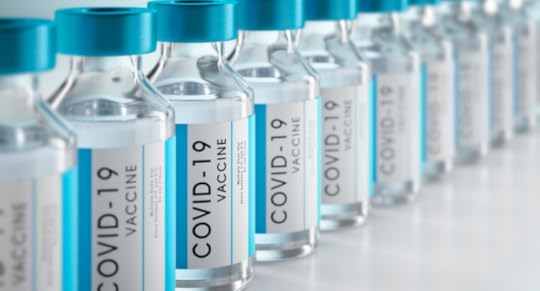Should people who have recovered from COVID take the vaccine?

By Marc Girardot | Trial Site News | July 6, 2021
Epidemiology1 , immunology2 and the clinical data3 all say a clear “No!”.
There is no good reason to vaccinate the recovered.
A British friend, recovered from COVID, decided to get vaccinated despite being naturally immune. This is the email he recently sent me:
“Marc I suffered a mild stroke on Wednesday 8 days after taking the Astrazeneca 2nd dose. Since I am a marathon runner I am a very ‘rare case’. I don’t smoke, have high blood pressure, high cholesterol, family history or come into any of the risk categories for blood clots…
You did warn me against taking the second dose and I wished I’d heeded your advice. I’ve taken a totally unnecessary risk with my life and I bitterly regret doing it.”
Contrary to most, Tony was informed; he had been told about the power of natural immunity, about the long—if not lifelong—duration of immunity, of the risk inherent to any medical procedure (Yes, vaccination is a medical procedure!), as well as of the rising levels of adverse events. He admitted he hadn’t imagined it could happen to him…
Though it is hard to assess precisely the actual severity and breadth of vaccine-related adverse events, it is very clear that vaccination against COVID-19 isn’t as harmless4 as pharmaceutical companies, mainstream media, academia, health authorities and the medical community have been saying. And, in contrast to high risk individuals who are still susceptible, recovered people have no real benefit to balance the additional risks of vaccination.
2021 Adverse Events Reporting
VAERS USEUROVIGILANCE EUROPE YELLOW CARDS UKDate18/06/202104/06/202116/06/2021Fully Vaccinated (Mn)148.46137.4430.68Deaths6,1364,5721,356Incidents387,288316,92573,944Death per 100,0004.13.34.4For over a year, mainstream media, health authorities as well as many “experts” have been downplaying the power of the immune system, dismissing natural immunity5 and proclaiming that immunity to COVID-19 was short-lived6. Simultaneously, vaccines have been portrayed as the silver bullet to this crisis, an incidental procedure with no risk whatsoever. The data shows a different picture and many are coming forward7 8, to challenge the official narrative. We will demonstrate that the official narrative is a dangerous fallacy.
The human immune system is one of the most sophisticated achievements of evolution. The survival of our species has depended on it for millenia. Today, we still very much rely on it. For the record, 99% of people infected with SARS-CoV-2 recover without treatment. Only 1% of SARS-CoV-2 patients, who did not receive early home-based treatment, end up hospitalized9. In other words, the immune system overwhelmingly protects. Even vaccines are entirely dependent on the immune system: vaccines essentially teach our immune systems what viral markers to be prepared for, they are not cures per se. Without a functional immune system, there can be no effective vaccine10.
On the waning immunity fallacy
Once recovered, the immune response recedes, notably via a decrease in antibodies. It is not only natural; it is indispensable to restore the body to a normal, balanced state. Just as a permanent state of fever is harmful, a high number of targetless antibodies or T-cells constantly circulating throughout the body could create serious complications, such as autoimmune diseases11. Taking an evolutionary perspective, only those whose antibody and T-cell count waned post-infection survived. So, a decreasing number of antibodies and T-cells is reassuring, even healthy.
[..]
But this decrease in T-cells and antibodies doesn’t mean that immunity is lost . It means the immune system has adapted to the new situation, and is now just on sentinel mode: Memory B- and T-cells, circulating in the blood and resident12 in tissues, act as vigilant13 and effective sentinels for decades:
[…]
Indeed, all recent studies show that specific anti-SARS-CoV-2 immunity remains effective20,21,22,23, possibly for a lifetime24. Our immune system is a modular platform, it can combine in an infinite number of ways to address a multitude of threats in a variety of contexts. As such it is neutral to the viral threats it faces. In other words, there is absolutely no reason to believe that those recovered from Covid-19 would lose their immunity over the years, or even the decades25 to come.
On the reinfection fallacy
You might have also heard of people becoming reinfected by SARS-CoV-2. Indeed, immunity, natural or vaccine-induced, isn’t the impenetrable shield described by many. Essentially harmless and asymptomatic reinfections do take place. That is, in fact, the very mechanism by which adaptive immunity is triggered.
However, symptomatic reinfections are very rare26,27. Like an army that adapts its response to the size and the progression of its enemy forces, adaptive immunity provides a specific, rapid and resource-optimized response. As such reinfections are mostly asymptomatic28 and recovered patients are protected from severe disease.
[…]
On the variant fallacy
As demonstrated by the low numbers of symptomatic reinfections mentioned above, and also by multiple studies31,32, variants have thus far not escaped acquired immunity. Just as Americans can speak and interact seamlessly in England, unhindered by a few word variants33, natural immunity is unhindered by variants, possibly more so than vaccine-induced immunity. There is ample evidence of the sophistication and breadth of the human immune system, and it is clear that a few minor gene changes in the virus cannot evade its arsenal .
[…]
Via https://alethonews.com/2021/07/08/should-people-who-have-recovered-from-covid-take-a-vaccine/
The Most Revolutionary Act
- Stuart Jeanne Bramhall's profile
- 11 followers



